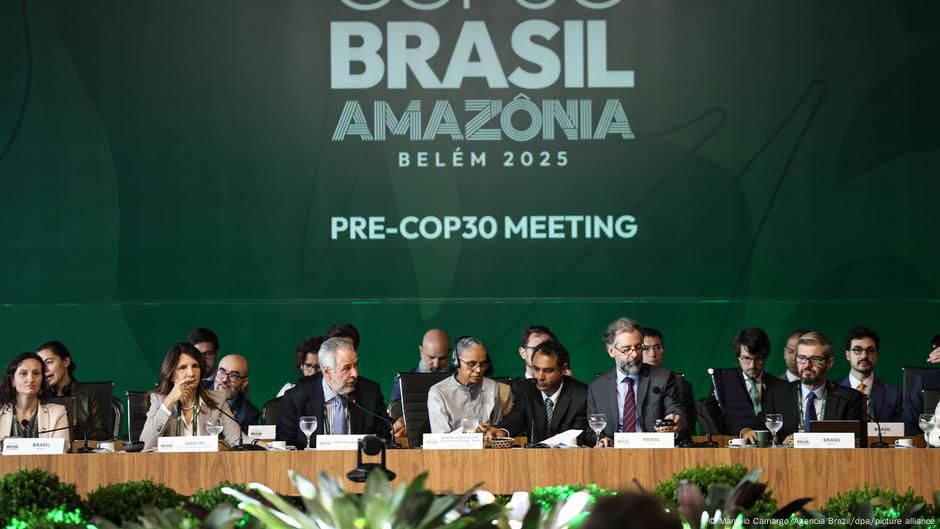Listen to the article
Upcoming UN Climate Summit Faces Wave of Disinformation as Trump Returns
The upcoming UN climate summit in Brazil faces unprecedented challenges from coordinated disinformation campaigns aimed at undermining global efforts to transition away from fossil fuels. Experts warn that false narratives about renewable energy and climate science threaten to derail meaningful climate action at COP30.
The summit comes at a particularly fraught time, with US President Donald Trump launching what climate advocates describe as an unprecedented assault on environmental protections and clean energy initiatives since returning to office in January. Trump has repeatedly used social media to spread false claims about renewable energy, asserting without evidence that wind turbines cause cancer and kill whales.
Through executive orders, Trump has pledged to “unleash” fossil fuel energy that he characterizes as “affordable and reliable,” while falsely claiming that renewable energy leads to job losses and higher costs for consumers. These assertions directly contradict market realities and scientific consensus.
“The Trump administration is employing a well-worn disinformation playbook, resurfacing outright denial tactics that were the fossil fuel industry’s favored approach in the 1980s and 1990s,” explained Kathy Mulvey, accountability campaign director at the Union of Concerned Scientists. She noted that fossil fuel companies have adopted strategies similar to those once used by tobacco companies – “manufacturing uncertainty about climate science and blocking climate, clean energy, and clean transportation policies.”
Climate summits have become major targets for fossil fuel industry influence. Analysis from last year’s COP29 in Azerbaijan revealed that more than 1,770 fossil fuel lobbyists gained access to the event, outnumbering the delegations from all but three countries. Research also showed that major energy companies spent millions on climate disinformation advertising ahead of previous climate summits.
Four oil and gas giants – Shell, ExxonMobil, BP, and TotalEnergies – were responsible for 98% of climate disinformation ad spending on Meta platforms before COP28. These coordinated campaigns occur as scientific evidence increasingly demonstrates that burning fossil fuels is accelerating climate change and intensifying extreme weather events worldwide.
In response to these challenges, COP30 will feature the first official initiative to combat climate misinformation at a UN climate summit. The Brazil-led Global Initiative for Information Integrity on Climate Change aims to fund research, investigative journalism, and communications campaigns that counter climate denial and amplify science-based solutions.
“We must fight the coordinated disinformation campaigns impeding global progress on climate change, ranging from outright denial to greenwashing to harassment of climate scientists,” said UN Secretary-General Antonio Guterres when announcing the initiative last November at the G20 summit.
Ece Elbeyi, consulting scientist at the Scientific Panel on Information Integrity about Climate Science, emphasized the importance of civil society collaboration: “When governments continue to expand fossil fuel production, even while publicly committing to net-zero goals, it is essential that civil society around the world join forces to ensure the availability of accurate, consistent, reliable, and transparent information.”
Climate watchdog organizations are also pressing media companies and technology platforms to screen harmful false content and provide transparency about disinformation sources. Philip Newell of the Climate Action Against Disinformation coalition stressed the need for “transparency and accountability” in reporting on climate issues.
The impact of Trump’s rhetoric is already being felt globally. Eva Morel, secretary general of climate NGO QuotaClimat, noted that “the return of Trump to power in January triggered a spike in unchallenged climate disinformation in French media,” with instances of climate deception tripling in French media during the first eight months of 2025.
These disinformation efforts come at a critical time. According to the latest Production Gap Report, nations are on track to produce more than double the amount of fossil fuels by 2030 than would be consistent with limiting warming to 1.5°C above pre-industrial levels.
For indigenous communities on the front lines of climate change, the stakes couldn’t be higher. Eliesio Marubo, activist and legal counsel for the Union of Indigenous Peoples of Brazil’s Javari Valley, cut through the euphemisms surrounding the issue: “I don’t like the term ‘fake news,'” he said. “It ends up legitimizing something that isn’t news at all. I prefer to call it what it really is: a lie.”
Fact Checker
Verify the accuracy of this article using The Disinformation Commission analysis and real-time sources.




5 Comments
Renewable energy has become the most affordable and reliable option in many parts of the world. It’s concerning to see the Trump administration spreading false claims that contradict market realities. COP30 must counter this effectively.
Tackling disinformation will be critical for the success of COP30. With so much misinformation out there, the summit must prioritize clear communication of the scientific consensus on climate change and energy transitions.
Trump’s baseless claims about renewable energy are worrying. We need leaders who will make decisions based on science and facts, not political agendas. I hope COP30 can cut through the noise and focus on real solutions.
The fossil fuel industry has a long history of using disinformation tactics to undermine climate action. I’m glad to see the COP30 summit recognizing this challenge and aiming to address it head-on.
This is a concerning issue. Disinformation campaigns can have a real impact on climate policy and action. It’s crucial that the COP30 summit addresses this challenge head-on with transparency and evidence-based messaging.